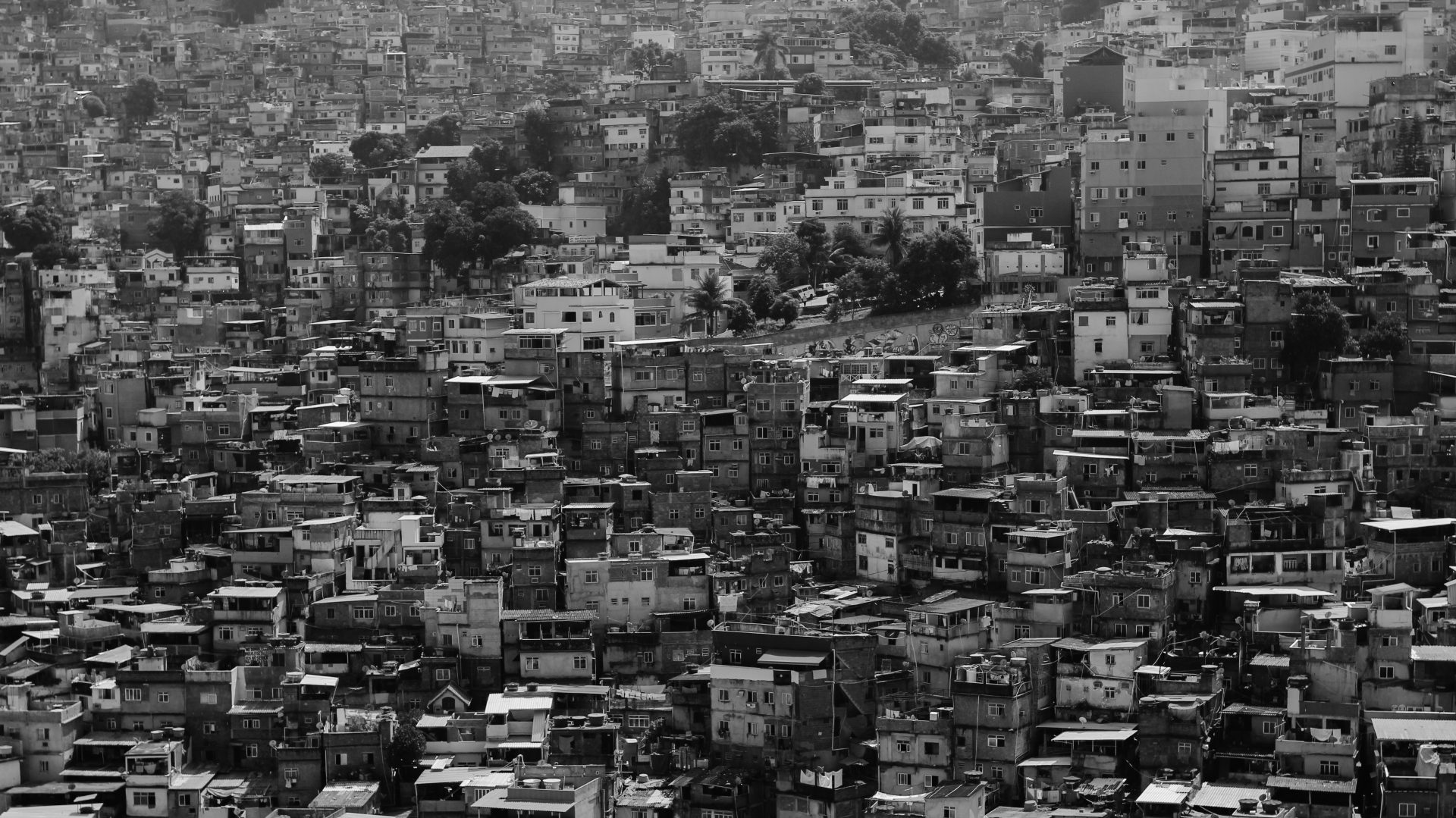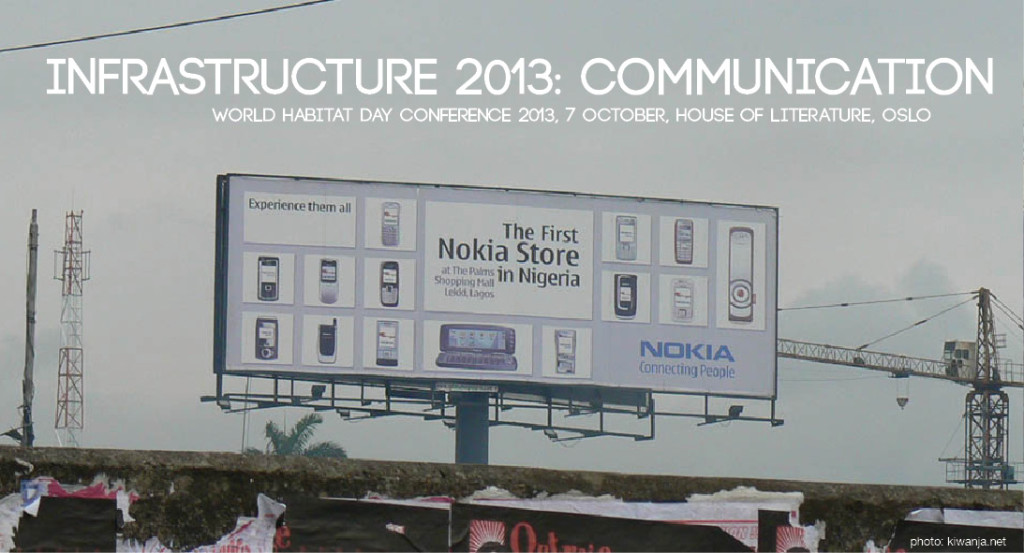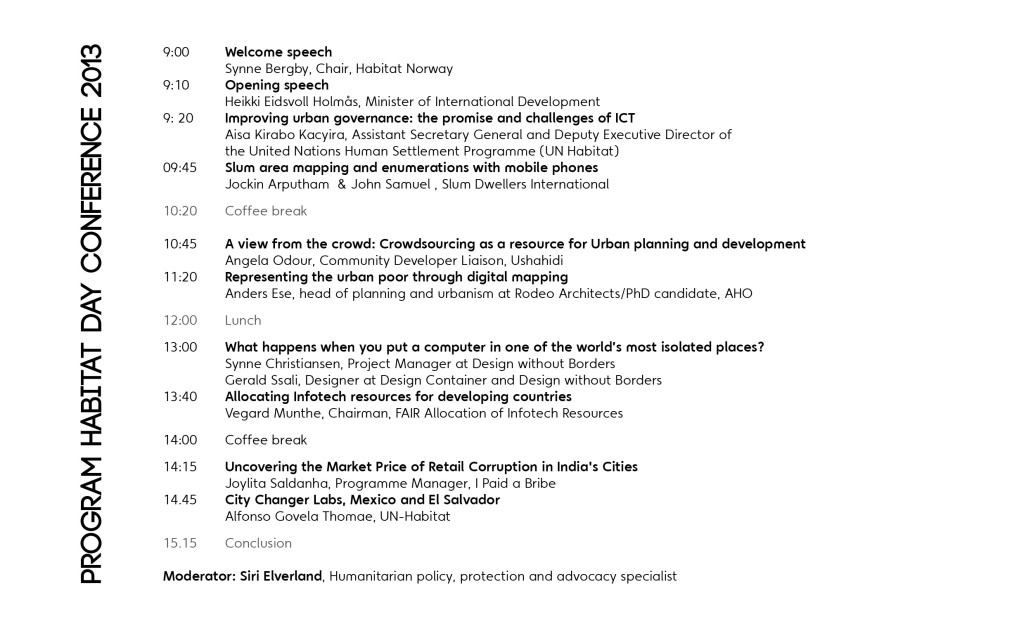World Habitat Day Conference 2013 – Infrastructure 2013: Communication
7 October at the House of Literature Oslo
How is Information and Communication Technology (ICT) serving as infrastructure in cities? And how does ICT contribute to bridge the gap between the formal and informal city, and further contribute to development and reduction of urban poverty?
Infrastructure 2013
In 2013, Habitat Norway has designated our activities to shed light on infrastructural challenges in growing cities and in informal areas. Throughout the year, Habitat Norway is hosting seminars focusing on the access to infrastructure and discusses new technology and opportunities. While five evening seminars are looking into the following matters: water, sanitation, electricity, public transportation and solid waste management, the Habitat Day conference is devoted to information and communication technology. More information about ‘Infrastructure 2013’ here: http://habitat-norge.org/infrastructure-2013/
World Habitat Day – Infrastructure 2013: Communication
Digital information and communication technology have become a necessary infrastructure of the urban environment today. For the inhabitants in informal settlements and the urban poor, new mobile technology, social media and internet services makes formerly unavailable services and information available. Mobile currency, medical information services, updates on security issues and prices on goods to mention a few, are communicated through internet and mobile phones. Open online maps enables inhabitants in settlements not visible in the formal maps to geotag their communities. The technology and social media increases transparency, but also provides a platform for urban poor to spread information on issues affecting them and voice their opinion.
What kind of role has these tools as a necessary infrastructure in urban planning and development strategies? Do they contribute to securing the rights of slum dwellers and contribute to a more prosperous life? How can new technology be utilized in response to urban poverty?
We have invited both national and international speakers to introduce the overarching issues related to information and communication technology in cities today, discuss ‘smart cities’ in developing countries, as well as give glimps of spesific projects and cases.
Speakers:
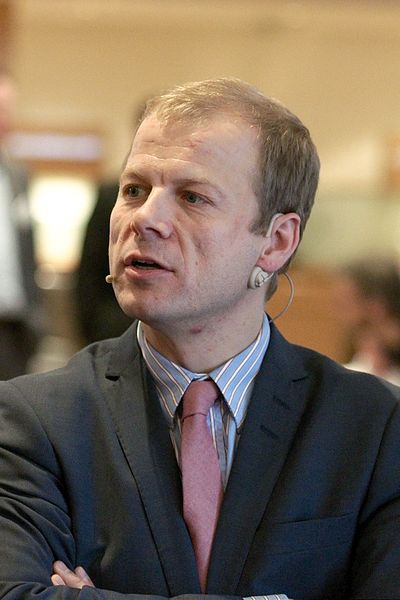 Heikki Eidsvoll Holmås, Minister of International Development
Heikki Eidsvoll Holmås, Minister of International Development
Opening Speech
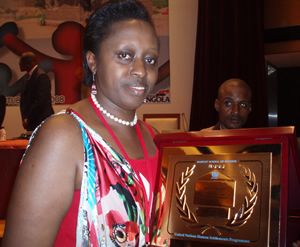 Aisa Kirabo Kacyira, Assistant Secretary General and Deputy Executive Director of the United Nations Human Settlement Programme (UN Habitat)
Aisa Kirabo Kacyira, Assistant Secretary General and Deputy Executive Director of the United Nations Human Settlement Programme (UN Habitat)
Improving urban governance: the promise and challenges of ICT
Access to infrastructure, and in this case, mobile technology and ICT can potentially have a big positive impact on urban governance and political participation. Political will as a base is imperative to meaningfully engage youth and women in urban governance irrespectively of technology, but with fast grow of low cost solutions the necessary tools and channels are there to be used. In terms of youth participation in urban governance, the question is no longer about what and why, but increasingly about how. UN-Habitat is in the forefront of working with youth and other stakeholders to enhance youth participation in governance at all level, and our profound view is that without including youth and women in a meaningful way, you cannot have neither sustainable development nor sustainable urbanisation.
Jockin Arputham, President Slum Dwellers International & John Samuel, Chief Enumerator National Slum Dwellers Federation, India
Making Counting Count – Why Slum Dwellers Enumerate Themselves
Slum Dwellers International (SDI) is a global non-governmental organization (NGO) started in 1996 that manages networks of urban poor and slum dwellers organized into federations, and which are usually based in the Global South. SDI’s talk will explain how SDI Federations profile, survey and map informal settlements from household to the city level.
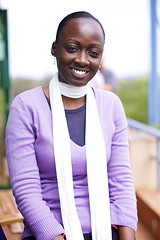 Angela Odour, Community Developer Liaison, Ushahidi
Angela Odour, Community Developer Liaison, Ushahidi
A view from the crowd: Crowdsourcing as a resource for Urban planning and development
Ushahidi is a non- profit organisation that specialises in development of free and open source software for information collection, aggregation and visualisation. This talk will demonstrate the importance of engaging with citizens in order to identify and prioritise needs for urban planning and development
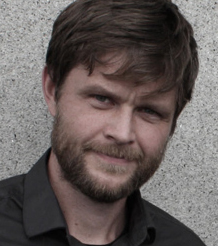 Anders Ese, head of planning and urbanism at Rodeo Architects/PhD candidate, AHO
Anders Ese, head of planning and urbanism at Rodeo Architects/PhD candidate, AHO
Representing the urban poor through digital mapping
Digital mapping efforts have come to make a significant mark on popular settlements. One important strand of digital mapping couples the growth of social media and participatory mapping into powerful and successful platforms. Based on the case of Map Kibera in Nairobi, a number of issues may need to be discussed in relation to these mapping efforts and certain claims made on their behalf. These relate to core issues regarding maps and mapping: technical matters such as collection, interpretation, and visualisation of data, as well as social issues pertaining to how egalitarian such mapping efforts truly are.
 Synne Christiansen, Project Manager at Design without Borders & Gerald Ssali, Designer at Design Container and Design without Borders
Synne Christiansen, Project Manager at Design without Borders & Gerald Ssali, Designer at Design Container and Design without Borders
What happens when you put a computer in one of the worlds most isolated places?
Design without Borders has 12 years of experience in using design methodology to develop products and solutions in a developing countries. In order to make solutions that can create change, the solutions have to be both functional and desirable for the end user. There is no “One size fits all”. Each challenge has to be approached with the local context and the end user in focus. Design without Borders is currently collaborating with Unicef Uganda in the development of a Rugged Solar Computer to be placed in youth centers throughout Uganda. What challenges has the project met, and what insights have the users of the computer provided to develop the project?
Vegard Munthe, co-founder and chairman of the board, FAIR Allocation of Infotech Resources
ICT’s role in Formal Education and Self Organized Learning Environments
ICT has enourmous potential for distributing knowledge and opportunities. The FAIR community has for over fifteen years sought to understand how this potential can be realized in poorer regions, and how it impacts local societies around the world. What works, and what doesn’t? What are the risks? What are the benefits? Which needs should and should not ICT try to satisfy? These are questions we briefly touch with case examples, and present suggestions open for discussion.
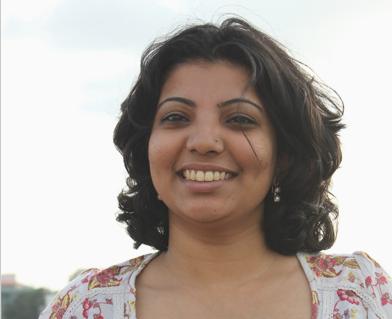 Joylita Saldanha, Programme Manager, I Paid a Bribe
Joylita Saldanha, Programme Manager, I Paid a Bribe
Uncovering the Market Price of Retail Corruption in India’s Cities
There is a great deal of difference between cities, in the specific manifestations of corruption for ordinary residents across these cities, the often corrosive impact it has on people’s ability to lead lives of dignity and aspiration, and how different cities are dealing with it differently – this talk looks at how I Paid a Bribe acknowledged that corruption is happening all around, didn’t try to moralize about it but just took a market approach and measured the data by allowing people to report bribes.
Alfonso Govela, UN-Habitat Consultant, City Changer Labs
Youth-Led Urban Development and Mobile Technology
City Changer Labs engage youth as an urban agent of change. As part of the UN-Habitat I’m a City Changer campaign, they enable environments for ecosystems of urban and civic innovation where youth develop mobile technologies of social relevance, foster their professional and business skills,
consolidate the economic sustainability of their initiatives, and facilitate the insertion of new high-tech business in their communities. Youth shape both the process and the outcome of personal and communal development, creating new tools for the planning, construction and operation of cities.
The conference will be moderated by Siri Elverland.
